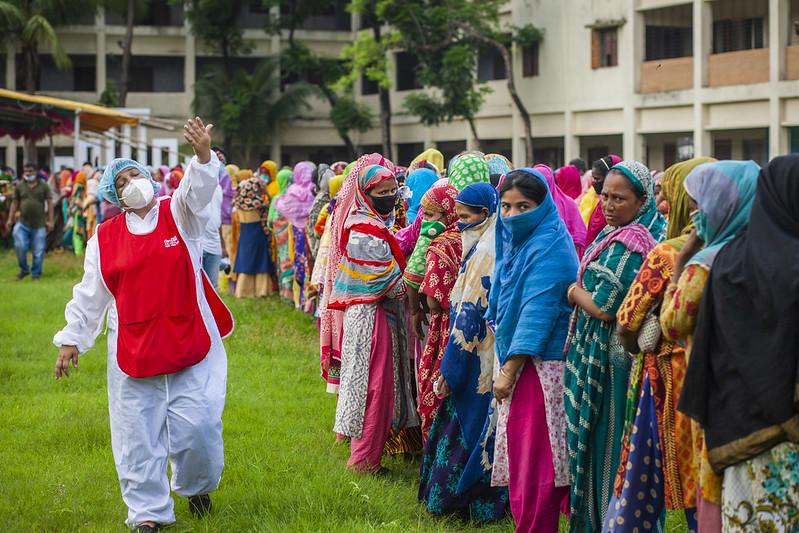
This article is part of ASPI’s 2020 series on women, peace and security.
With 2020 marking the 20-year anniversary of the United Nations Security Council’s adoption of resolution 1325, it had long been anticipated that this would be a pivotal year for the women, peace and security agenda. But no one could have possibly foreseen just how pivotal Covid-19 would make it. In Asia and the Pacific, the widespread use of emergency powers and security-oriented responses to control the pandemic has had negative effects on peace and security, and the human rights of women and girls, including inflaming conflict and delaying the progress of peace.
Guided by 10 Security Council resolutions and related frameworks, the WPS agenda is designed to promote the full and equal participation of women in all peace and security efforts. While progress has been made towards this goal over the past two decades, Covid-19 threatens to reverse some of the hard-fought gains of women peacemakers and gender-equality advocates by marginalising them from engaging in the peace and security dimensions of the pandemic. After two decades, the WPS agenda is facing an urgent reckoning on whether it is fit for purpose.
To date, there are already significant peace and security impacts of Covid-19 on women in the region.
Women have reported facing sexual harassment from law enforcement policing movement controls in Malaysia. In the Philippines, police have been accused of demanding sexual favours in exchange for allowing women to pass through quarantine checkpoints. Increasing incidents of intimate partner violence during lockdowns are being documented.
Communal tensions and discrimination are being fuelled by Covid-19. In Cambodia, blame has been cast on the minority Muslim community for spreading the disease. In Indonesia, land disputes between private companies and communities have escalated while the attention of government authorities is focused on the pandemic. Conflict-prevention approaches that engage women are sorely needed.
Following UN Secretary-General Antonio Guterres’s call for a global ceasefire on 23 March, ceasefires were declared in the south of Thailand for the first time in 17 years and in the long-running communist insurgency in the Philippines. Despite early optimism, however, fighting has since resumed. Only 11% of ceasefire agreements include gender provisions, which is half the rate found in other types of peace agreements.
The peace processes in Myanmar and Afghanistan—which women have struggled for inclusion in—have been delayed and derailed by the onset of the pandemic.
In Afghanistan, the pandemic is escalating at a critical time in the advancement of intra-Afghan dialogue, further limiting women’s opportunity to participate. The government appointed a team of 21 negotiators, originally including five women. With this lack of gender parity, the engagement of women’s civil society to influence the terms and content of the potential peace dialogues is crucial. But the restrictions on movement and physical gatherings introduced to limit the transmission of Covid-19 pose a barrier to women’s collective advocacy.
This problem is compounded by the increased reliance on technology and digital collaboration, which excludes many women from participating. Only 14% of the population in Afghanistan has access to the internet. In addition, women’s organisations are facing a lack of funding and support to deal with these new challenges. As the process towards peace dialogues moves forward, the barriers to women’s ability to meaningfully participate must be addressed.
A survey of WPS civil-society organisations in the region conducted by UN Women found that the pandemic was affecting their ability to deliver services. The majority of organisations reported that they were only partially operational. Restrictions on movement and activities; lack of access to communities and women; cancellation or delay of collaboration with donors, governments and partners; redirection of funding to Covid-19 responses; and a shift towards digital-only service delivery were cited as some of the negative impacts.
These challenges are a reminder that we can’t afford to exclude the skills and experience of women, especially in times of emergency.
The Security Council already recognises health pandemics as part of the WPS landscape. Resolution 2242, for example, highlights the need for women’s participation and leadership in all responses. In 2016 during the Ebola outbreak in West Africa, the Security Council adopted resolution 2177, which emphasised that responses ‘should address the specific needs of women’ and stressed the importance of women’s ‘full and effective engagement in the development of such responses’.
The Security Council is yet to produce a resolution in response to Covid-19, but Guterres has called for effective implementation of the WPS agenda throughout the pandemic. Heeding this call is vital to ensure the gendered dimensions of the crisis are not overlooked.
In Asia and the Pacific, the WPS agenda demands immediate and practical actions. This requires ensuring women’s participation in decision-making; actively investing in women-led conflict-prevention efforts to stop Covid-19 from fuelling tensions; protecting women from gender-based violence in their homes and communities; and supporting women to lead in relief and recovery efforts.
Critically, women’s civil-society organisations must be supported by establishing effective mechanisms for their policy contributions, supporting their work in communities, and allocating funding from crisis-response budgets to enable them to continue their work.
If these efforts are central to the Covid-19 response, the WPS agenda in its 20th year can play a key role.